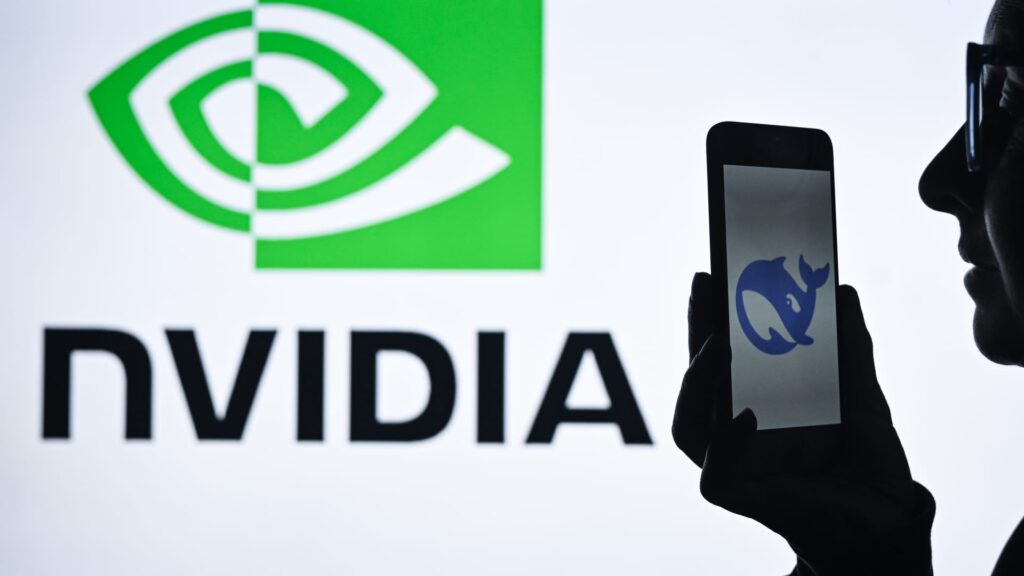A woman holds a cell phone featuring the DeepSeek logo, with the Nvidia logo displayed in the background.
Nurphoto | Nurphoto | Getty Images
As China and the U.S. compete in artificial intelligence, Southeast Asia should draw from the best of both countries while building its own technologies, panelists said at CNBC’s East Tech West 2025 conference on June 27 in Bangkok, Thailand.
Julian Gorman, head of Asia-Pacific at mobile network trade organization GSMA, said it would be a negative development if Southeast Asia was forced to pick a side.
“Southeast Asia is very dependent on both economies, both China and America. I think it’s pretty hard to consider that they would go one way or the other,” Gorman said.
“It’s very important that we continue to focus on not fragmenting the technology, standardizing it, and working so that technology transcends geopolitics and ultimately is used for good,” he added.
The spread of U.S. and Chinese AI companies into new global markets has been a big trend this year as both Beijing and Washington seek more global influence in advanced technologies.
U.S. and China offerings
According to George Chen, managing director and co-chair of digital practice for The Asia Group, Southeast Asia had initially been leaning towards AI models from the U.S., such as those from Google and Microsoft.
However, the emergence of China’s DeepSeek has propelled the popularity of the company’s models in Southeast Asia due to its low cost and open-source licensing, which can be used to build on and adapt models to regional priorities.
Open-source generally refers to software in which the source code is made freely available, allowing anyone to view, modify and redistribute it. Large language model players in China have been leaning into this business model since DeepSeek’s debut.
Previous panels at East Tech West have flagged open-source models as an important tool for regions outside of China and the U.S. to build their own sovereign AI capabilities.
Meanwhile, on the hardware side, the U.S. remains a leader in AI processors through chip giant Nvidia. While the U.S. has restricted China’s access to these chips, they remain on the market for Southeast Asia – which Chen suggested the region continue to take advantage of.
However, Chen noted that there is a possibility that the AI landscape could change dramatically in a decade, with China being able to provide more affordable alternatives to Nvidia.
“Don’t take a side easily and too quickly. Think about how to maximize your economic potential,” he suggested.
GSMA’s Gorman pointed out that facing this “balancing act” between the superpowers is not new for Southeast Asia. For example, the region’s mobility industry heavily relies on Chinese tech manufacturing and hardware, as well as the U.S. for other areas such as telecommunications.
Southeast Asia’s edge
Though the U.S. and China are clearly ahead in building advanced AI models, Southeast Asia has its own edge in the global AI space, panelists said.
“If you think about AI as a technology, eventually you need to apply it to a real product to service. That’s how people can use it,” said The Asia Group’s Chen.
The region has a strong app environment which offers “great potential,” he added. “The demographic is young, which means the potential for talent is always there, and R&D cost is relatively cheaper than other places.”
Cost considerations have already contributed to Malaysia’s growth as a global powerhouse in AI data centers and computing, particularly in the southern Johor region.
Still, Southeast Asia should make sure to bring in companies which have advanced manufacturing that domestic industries can learn and benefit from – a strategy that China used to catch up to the West in advanced technologies, said Chen.
Leader in AI regulation?
According to GSMA’s Gorman, Southeast Asia could also be a neutral ground between China and the U.S., where the two sides come together and have high-level dialogues on how to apply AI responsibly.
Southeast Asia can also play a proactive role in AI regulation itself, he said, citing recent examples of regulatory leadership from the region, such as Singapore’s Shared Responsibility Framework for tackling international scams and fraud.
So far, there have been few global regulations on AI. While the EU has adopted a policy, the U.S. and ASEAN countries have yet to follow suit.
Chen added that the region will need to band together and adopt common frameworks to gain a more prominent seat at the table of global AI development and regulation.


